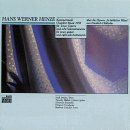| All Artists: Henze, Jenkins, Walker Title: Chamber Music 1958 for Tenor Guitar & 8 Instrument Members Wishing: 2 Total Copies: 0 Label: Koch Schwann (Germ.) Release Date: 9/14/1994 Genres: Pop, Classical Styles: Vocal Pop, Opera & Classical Vocal Number of Discs: 1 SwapaCD Credits: 1 UPC: 099923601326 |
Search - Henze, Jenkins, Walker :: Chamber Music 1958 for Tenor Guitar & 8 Instrument
 | Henze, Jenkins, Walker Chamber Music 1958 for Tenor Guitar & 8 Instrument Genres: Pop, Classical
|
Larger Image |
CD Details |
CD ReviewsAtonal lyricism, rather grey in colors, but eliciting a cert Discophage | France | 10/27/2007 (4 out of 5 stars) ""Atonal lyricism" may sound as a contradiction in terms, but it is I think a fitting description of Kammermusik 1958 of Hans Werner Henze. Henze was reviled by Boulez and cronies for his ecleticism and Romantic bent, which viewed from today can be taken as a compliment. Kammermusik 1958 is a 48-minute piece written for Tenor, Guitar and 8 solo instruments after poems by Hölderlin. Architecturally it alternates between movements written purely for the instrumental ensemble (Prefazione-track 1, Sonata-7, Cadenza-9 and the final Epilogo, added in 1963), for voice and guitar (2, 8, 10), voice accompanied by instrumental ensemble (4, 6, 12) and for solo guitar (the Spanish-inspired Tentos, tracks 3, 5 and 11)
The mood is mostly pensive, reflexive and contemplative, with occasional vehement outbursts (track 4 around 1:30, the three first minutes of track 6 for instance). Romantic the music is not, though Henze doesn't shun the florid melismatas (try track 10, among others), but these are atonal, and some of the instrumental interludes can be pretty thorny, with several apparently independent-moving atonal instrumental lines. Overall the vocal writing is in a style reminiscent of Berg's in Lulu. At times, and not only because it is scored for tenor, the piece brings Britten to mind - it even starts with a horn solo that must be a direct hommage to the Serenade. One is then not surprised that it is dedicated to Britten and that it was premiered by Peter Pears - quite a brave stance back in those serial, Darmstadt years. But Kammermusik 1958 is more stern, austere and terse and its colors are grayer than anything Britten wrote. It is hardly seductive then, but it does leave its mark after a while, and elicits a certain fascination, the kind that might be born of a rainy Sunday afternoon. This Koch Schwann Musica Mundi disc was released in 1988 and its timing is short for a CD, but it is the only available recording I am aware of of this composition. The tenor, Neill Jenkins, has traces of English accent and a fine, light lyrical voice. " |

 Track Listings (13) - Disc #1
Track Listings (13) - Disc #1